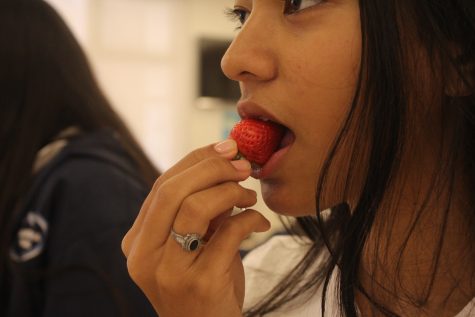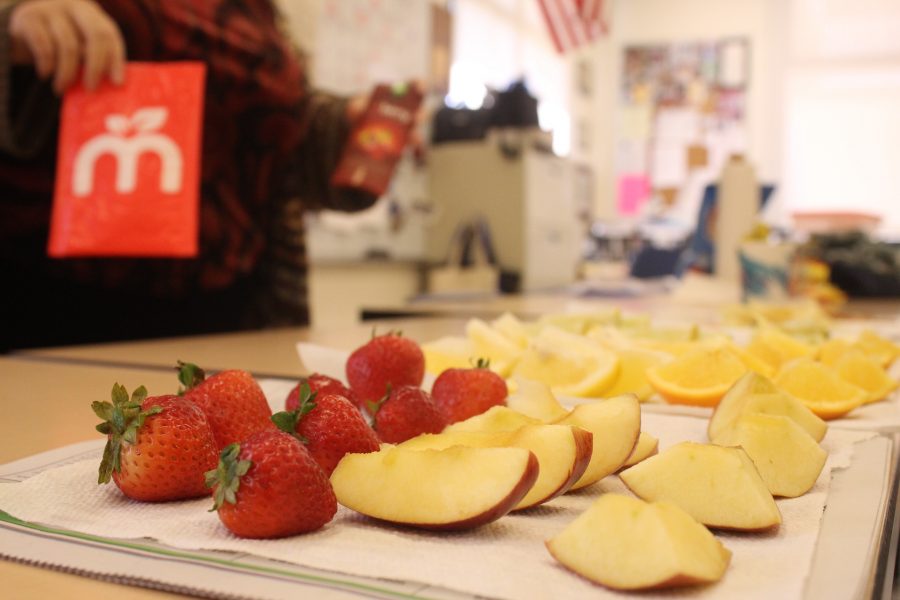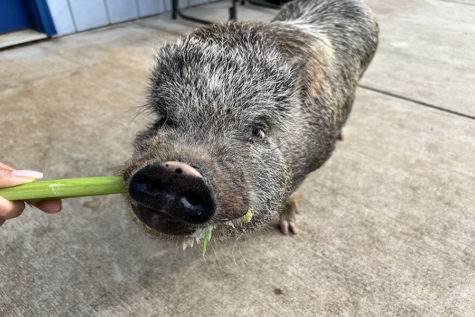Miracle berries: Do they really work?
Photo by Aaron Veincent
Junior Deven Aruda cringes at the bitter taste of the mberry tablet. The journalism class tried them to see if claims that they made sour foods taste sweet were true.
What if you bit into something sour, but it actually tasted sweet? Well this is a question that the journalism class, as well as media adviser Mr. Jay Paʻa, wanted to answer when they tested miracle berry tablets for the first time on Thursday, Dec. 14.
Miracle berries are a type of fruit that, when consumed, dampens the consumer’s sour and bitter taste buds to give sour foods a sweet taste. This happens through a naturally-occuring chemical called miraculin.
The miraculin is extracted from the fruit by companies such as mberry and placed within a dissolvable tablet for easy consumption.
Going into the “taste tripping” many of the participants were skeptical about whether the tablet would actually work.
According to the directions, the tablet had to be placed on the middle of the participant’s tongue and then moved around to cover a larger surface area.
“The directions and reviews said that the tablet had to dissolve in order for it to work, but it took forever and wasn’t the best taste,” junior Deven Aruda said.
While waiting for the tablet to dissolve, most of the students complained about the taste, which most compared to green tea.
Anxious to test it out, many bit into the tablet despite what the directions and reviews said. The first was junior Brianne Reformina.
Students brought various foods including some sour, some salty, some savory, and some sweet.
Reformina first tested her tastes buds out on a lime. After her first taste, she was quiet for awhile, while others anticipated her conclusion.
With surprise on her face, Reformina clearly showed that the berry had indeed worked; however, when the others participants began testing it out, they came to mixed conclusions.
“I let it dissolve on my tongue when everyone else bit into theirs, but I donʻt think it made a difference because the food tastes the same as it normally tastes,” junior Holly Honda said.
The participants had some interesting food choices. The odd menu consisted of limes, lemons, oranges, strawberries, apples, pickles, sour patch kids, mustard, Caesar salad dressing, Shoyu, pretzels and salt and vinegar potato chips.

After dissolving a miracle berry on a tongue, the tongue’s taste buds become temporarily altered. Deven’s strawberry tasted extra sweet, almost like candy, thanks to the miraculin in the miracle berry tablet.
Most people went straight for the sour fruit.
“It didn’t work. It absolutely did not work for me,” Mr. Paʻa said after biting into a lemon and making a sour face.
Meanwhile, others explored what would happen to sweet foods, like strawberries.
Many agreed that in comparison to the sour items, the difference in taste of the sweet foods was more evident.
“It intensifies sweet things, so it kind of works,” Aruda said.
In general the tablet was supposed to last up to a half hour, but most participants seemed to be losing their extra sweet taste buds after the ten minute mark.
Overall, most agreed that the berries worked, but they didn’t make as dramatic a difference in the sour foods as they had hoped for. Some were glad they’d tried them in a been-there-done-that way, while others said that they’d be up for doing it agin.
The tablets are available from Amazon as well as other food and supplement sellers online.













